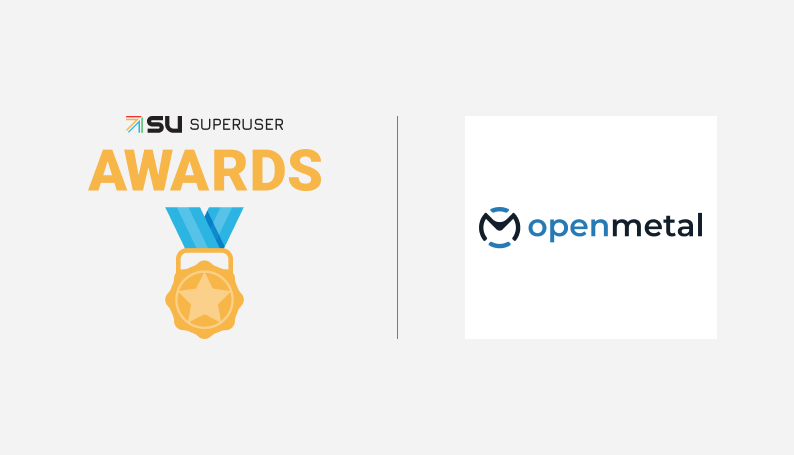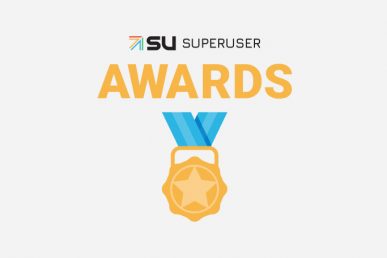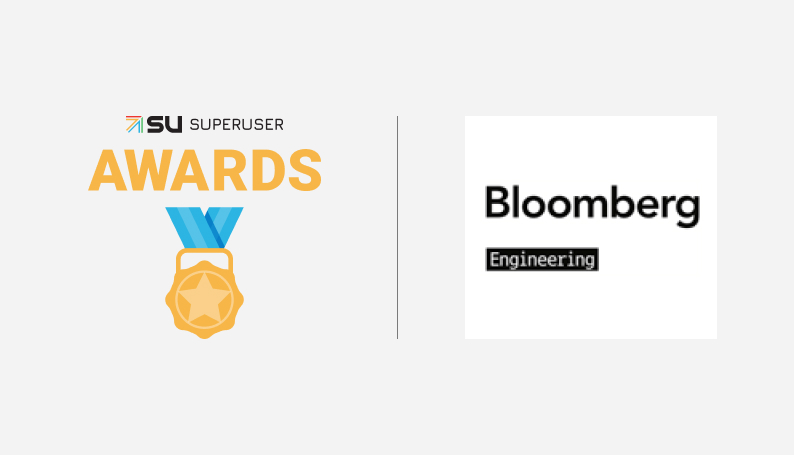Who do you think should win the 2022 Superuser Awards? The annual Superuser Awards is to recognize organizations that have used open infrastructure to improve their business while contributing back to the community.
This year, the Superuser Awards winner will be announced at the OpenInfra Summit Berlin, June 7-9! Join the global community for its first in-person Summit in over two years and collaborate directly with the people building and running open source infrastructure using OpenStack, Kubernetes and 30+ other technologies. Get your Summit tickets before the price increases on May 17!
OpenMetal is one of the 11 nominees for the Superuser Awards 2022. Check out why its team getting nominated:
Who is the nominee?
OpenMetal has been a total team collaboration project, strengthened by participation from the following leadership, engineering, sales, and marketing team members:
Yuriy Shyyan, Operations
Jadon Naas, Product Development Chris Bermudez, Engineering Jacob Hipps, Operations
Rafael Ramos, Engineering Johnathan Maudlin, Engineering Nick West, Engineering
Madeleine Etheridge, Engineering Daniel King, Engineering
Julien Fernandes, Engineering Michael Mayer, Engineering
Jeff Stever, Sales
Tim Monner, Marketing
Rebecca Shultz, Marketing
Sash Ghosh, Marketing
Ray Meyers, Finance
Todd Robinson, Leadership
How has open infrastructure transformed the organization’s business?
For us, it’s more about enabling others to transform their business. Our mission is to make OpenStack more accessible, allowing smaller teams to leverage OpenStack against the increasing need for Cloud. We have automated deployments of full OpenStack and Ceph hyper-converged clouds to deliver on-demand private cloud in 45 seconds. Companies that couldn’t afford the startup expense or time to spin up an OpenStack can now get their own cloud in the time it takes to get a VM from a public cloud provider. Our hope is that this new accessibility to OpenStack is transformative for all who have wished to be in OpenStack but couldn’t cross the barriers that existed before. Today, we are scaling our hardware, data centers, and sales staff to keep up with demand that is outpacing expectations.
How has the organization participated in or contributed to an open source project?
OpenMetal is a Silver Member of the Open Infrastructure Foundation and an Infrastructure Donor to the Open Infrastructure Foundation. OpenMetal evangelizes for, and promotes, OpenStack and the adoption of open source technologies. OpenMetal has a long pedigree of contributions to open source projects thanks to parent company InMotion Hosting’s decades-long commitment to open source projects like WordPress and Joomla. Members of the team have also contributed to various open-source projects (either through bug reports or fixes), such as PHP, Kolla-Ansible, Ironic, and others.
What open source technologies does the organization use in its open infrastructure environment?
The OpenMetal team uses a wide variety of open source technologies to power its open infrastructure environment including but not limited to Linux, CentOS 8 Stream, Python, Ansible, Kolla, Kolla-Ansible, Docker, Ceph, OpenStack, JavaScript, Angular, PHP, NGINX, Kubernetes, packer, prometheus. Our use of open source technology spans our entire organization and our entire infrastructure stack.
What is the scale of your open infrastructure environment?
At this time we operate 30-35 individual dedicated OpenStack private clouds in our Ashburn, Virginia data center. We currently operate a single datacenter with plans to expand into new data centers in Los Angeles and in Europe in the next 6-12 months. We currently have over 2,700 CPU cores available across our hardware footprint in our Ashburn, Virginia data center and are currently in the process of adding another 1,280 CPU cores for use with OpenStack private clouds. For storage, we primarily utilize Ceph for both block and object storage. We currently have over 100TB of storage available to our private clouds (combined total), and over 4.5PB of object storage in our parent company InMotion’s backup architecture.
What kind of operational challenges have you overcome during your experience with open infrastructure?
The challenge was automating the deployment of a private cloud, including bare metal within data centers. Using tech, like Packer and Ironic (done in a standalone configuration), we create bare metal images, purpose-built for the hardware they support and enable monitoring and orchestration of the hardware via IPMI/Redfish. To keep private cloud networks separated, we use tools and networking management APIs to automate networking configs. We then create these networks at the time of provision and separate the traffic within the clouds per best practices seen in deploying both distributed compute and storage systems. A mix of network hardware from different vendors, allows us to roll our own network management solution to enable on-demand provisioning of IP space, VLANs, and trunking.
How is this team innovating with open infrastructure?
The OpenMetal team is extending our automation infrastructure to deploy more than OpenStack private cloud. We are adding the ability to deploy pure Ceph (that is, no OpenStack) clusters for mass storage, to deploy flexible bare metal clusters, and to deploy enterprise open source software that has historically been difficult for smaller teams to deploy on their own. We want to lower the barrier for entry for other enterprise software like OpenStack to help level the playing field for smaller businesses and organizations. We currently have preliminary support for GPU and vGPU provisioning on our private clouds to enable AI, machine learning, and other use-cases that can benefit from GPGPU hardware (such as the NVidia A100).
The Superuser Editorial Advisory Board will review the nominees and determine the finalists and overall winner after the community has had a chance to review the nominees. Stay tuned!
- Exploring the Open Infrastructure Blueprint: Huawei Dual Engine - September 25, 2024
- Open Infrastructure Blueprint: Atmosphere Deep Dive - September 18, 2024
- Datacomm’s Success Story: Launching A New Data Center Seamlessly With FishOS - September 12, 2024

)










